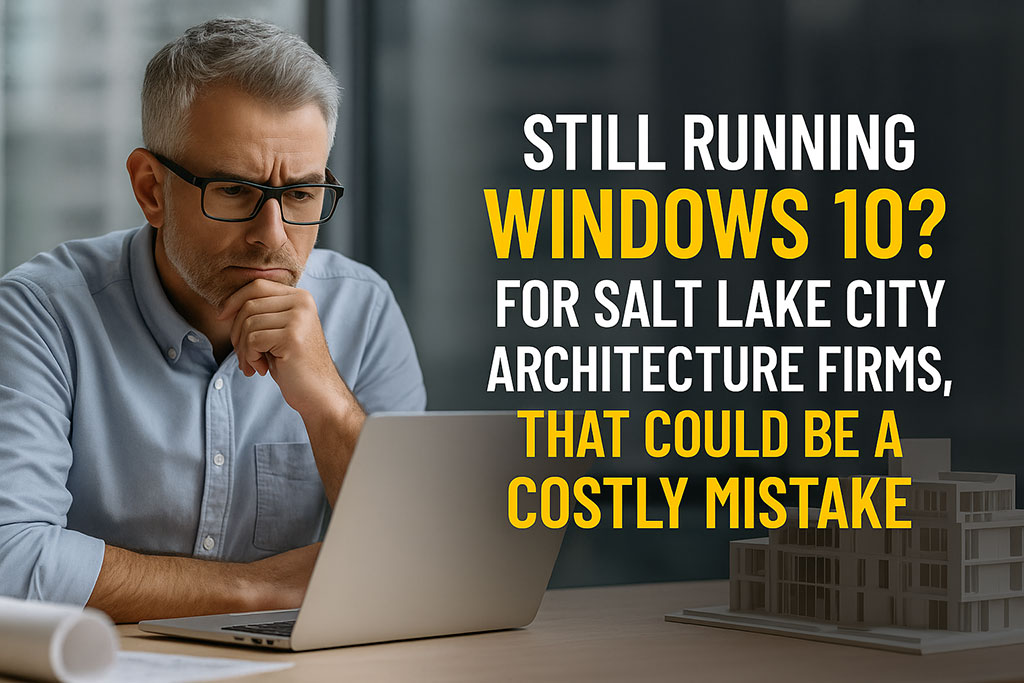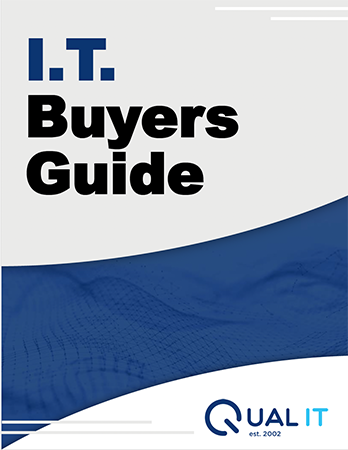
Let’s not sugarcoat it:
Microsoft ends all support for Windows 10 on October 14, 2025.
That means:
- ❌ No more security updates
- ❌ No more bug fixes
- ❌ No more tech support
And for architecture firms in Salt Lake City—where tight deadlines, high-stakes clients, and cutting-edge design tech are the norm—waiting to upgrade could quietly cripple your firm before you even realize it.
“We’ll Deal With It Later” Is a Risky Design Plan
Upgrading your entire firm to Windows 11 isn’t glamorous. But just like skipping foundational reinforcement in a high-rise, the real cost shows up when things start to crack.
If your studio is still using Windows 10 on your design workstations, you’re exposing yourself to:
- Security vulnerabilities
- Compatibility failures
- Performance slowdowns
- Compliance risks
- Emergency upgrade chaos
Let’s break it down.
- 🚨 Your Cybersecurity Shield Is About to Vanish
Windows 10 without updates is a hacker’s playground.
If you’re storing client blueprints, renderings, or proprietary BIM files, those assets become prime targets.
Without security patches:
- Every login becomes a potential breach
- Your Revit, AutoCAD, or BIM data could be exposed
- Client trust evaporates the moment a leak happens
📐 Architectural IP is worth protecting—don’t leave it to luck.
- 🧩 Your Design Software May Stop Playing Nice
The architecture world moves fast. Software vendors are already phasing out support for Windows 10. Soon, you might notice:
- BIM 360 updates failing
- Rendering crashes mid-project
- Sync issues with cloud storage
- Printers and plotters that suddenly “stop talking” to your machines
👎 Imagine your lead architect unable to open a 3D model the day before a client presentation.
- 🐢 Slow Systems = Lost Hours (and Dollars)
Outdated OS = sluggish workflows.
Every lag, crash, or loading screen adds up—especially in architecture, where every hour is billable.
If each team member loses just 15 minutes a day to slow tech, that’s:
- 5 hours/month
- 60 hours/year
- Across a 20-person team? That’s 1,200 hours lost annually
⏱ That’s more than a project phase gone to waste.
- 💸 Emergency Upgrades Are Expensive and Disruptive
When Windows 10 systems start failing, firms panic.
That leads to:
- Rushed hardware buys at inflated prices
- Overtime IT labor costs
- Productivity dead zones while devices get swapped out
🚫 You don’t want your upgrade plan to be “hope nothing breaks this week.”
- ⚖️ Compliance Trouble Could Be Waiting
If your Salt Lake City firm handles government, healthcare, or financial design projects, compliance isn’t optional.
Continuing with Windows 10 after support ends could put you out of alignment with:
- CMMC
- HIPAA
- PCI-DSS
- Local procurement regulations
⚠️ That’s not just a tech issue—it’s a legal one.
What Smart Architecture Firms Are Doing Right Now
Forward-thinking firms aren’t waiting for disaster. They’re:
✅ Auditing devices and identifying aging hardware
✅ Testing software compatibility with Windows 11
✅ Budgeting upgrades in phases
✅ Partnering with IT experts who specialize in the architectural space
Your Proactive Upgrade Roadmap (No Panic Required)
Here’s how to make the transition with zero downtime:
- Run a Compatibility Assessment
Not every workstation is Windows 11-ready—know which ones to retire. - Audit Your Software Stack
Ensure Revit, SketchUp, Enscape, and project management tools run clean on Windows 11. - Plan Your Hardware Budget Now
Avoid future price spikes or supply chain issues. - Work With an MSP Who Gets Architects
We specialize in helping Salt Lake City firms move fast—with secure, BIM-ready systems that don’t miss a beat.
🎯 Don’t Wait Until October 2025 to Panic
Waiting = higher costs, more stress, and major project risks.
Let’s get ahead of it—together.
🛠 Book Your FREE Network & Windows Upgrade Assessment Today
We’ll assess your current environment, identify any red flags, and build a seamless migration plan that fits your budget and timeline.
🔒 No downtime
🚀 No disruptions
📈 Just fast, secure, architecture-ready IT
👉 Click here to book a 15-minute Discovery Call.
Let’s build a tech foundation as solid as your next project.



